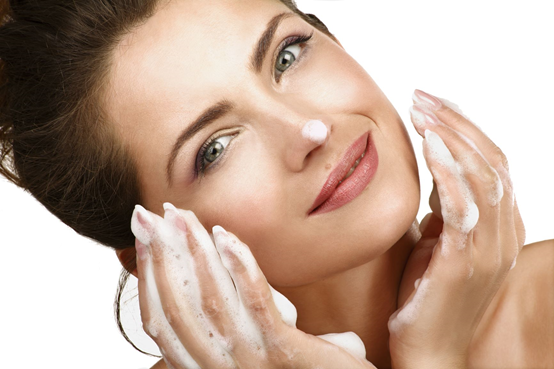Skincare is a unique process for everyone. Beauty routines range from the systematically meticulous to borderline nonexistent. But the truth of the matter is that no matter where you lie in the skincare spectrum, you could be making mistakes that cause your skin to age simply by washing your face incorrectly. We spoke to Dr. Manish Shah, who is a board-certified plastic surgeon and anti-aging expert in Denver, Colorado. He counsels patients on cosmetic procedures, maintaining results, optimizing their skincare, and preventative measures. “While skin treatments, injectables, and surgery can help maintain the visual appearance, your basic skincare goes a long way toward preventing premature aging.

You Are Washing Your Face Incorrectly If You Do The Following:
Using too much toner
Facial toners are an essential part of any beauty routine. However, using too much toner can dry out the skin and may even lead to more sebum production as your glands attempt to overcompensate. If you find your skin feeling tight or irritated after applying toner, you may be using too much, and this is especially true if you have sensitive or combination skin. Some toners come in a spray bottle, which is great for applying a light layer over the skin after cleansing. If not, simply pour a few drops of toner on a cotton pad and gently glide it across the face.
Also, many toners have alcohol-based ingredients, such as denatured alcohol, in them. Avoid toners with these ingredients at all costs — as they will dry the skin completely and remove natural oils needed to keep the skin moist and healthy.
Products that are too harsh
As consumers become more sophisticated, they inquire about ingredients such as retinol. They know it is super hydrating and great for the skin, but they don’t understand that skincare needs to be sustainable, so they ask for the strongest, most active form of prescription retinoid. “This is a mistake,” says Dr. Shah, “any credible doctor will first assess the condition of your skin alongside the products and treatments you are already using in order to determine if you need prescription retinol or if a less active form sold over-the-counter is better for you.”
Dr. Shah explains that “retinol in less active forms will have similar effects without irritating the skin as much, which will be helpful to you as you continue using a product on your skin over time.”
Scrubbing too hard
Instead of rubbing and scrubbing your face to try to get it squeaky clean, your motions with your cleanser should be as gentle as possible. Your hands should not be doing all the work! Scrubbing the skin too harshly or with materials that add exfoliation can cause micro-tears in the skin as well as excessive elimination of essential oils which leave the skin dry.
Over exfoliating
While gently exfoliating a few nights a week can do wonders for the skin, it’s easy to go overboard. What keeps your skin looking fresh, young, and hydrated is preserving the outer layers glow by lightly helping it shed old skin cells and moisturizing to help cell turnover. However, “the danger is that many people don’t think to consider their loofah or washcloth as an exfoliation tool. Even if you are only using an exfoliant a few days a week if you are scrubbing with a harsher material every day, you could be exfoliating more than you intend and that can cause dryness, red patches, dehydration, and hyperpigmentation,” warns Dr. Shah.
Washing with hot water
Though it might feel good, using hot water to cleanse your face can actually dehydrate it. Hot water can be abrasive, stripping the skin of its natural oils, leaving it dry and flaky. This can also lead to acne flare, breakouts, and skin irritation. For best results, rinse your face with lukewarm or cool water – not cold either – to help constrict blood vessels. Dr. Shah also points out that “hot water enlarges your pores, and this can affect the oil production of the skin as well as the texture of it.”
Washing more than twice a day
You may be thinking, the cleaner, the better, right? Think again. Over-washing your face can actually damage the skin’s natural protective system, which then can affect how easily the environment irritates your skin, how efficiently you retain moisture, and—over time—cause you to show early signs of aging such as fine lines and dry patches. “As a general rule of thumb, you should not be washing your face more than twice a day. If you have an activity like working out or an outdoor sport in the middle of the day, try to use a bland soap or cleanser to wash away dirt and sweat without further irritating the skin,” advises Dr. Shah.
Forgetting to follow up with a moisturizer
“The best time to apply moisturizer is after the shower or after applying toner. This will help prevent excessive dryness, and it will help to skin retain moisture,” says Dr. Shah. Moisturizers also come with a combination of vitamins and lipids that help the skin heal irritations, strengthen its protective functions, and look smoother and healthier.
Washing with whatever soap is available.
Many people are guilty of this one. People may think that soap is soap and a clean face is just a clean face, but you could be damaging your skin and aging yourself by washing the face with any available hand soap. Soaps with fragrances can be especially irritating to the skin. Overall, these soaps are not made for the face, and while this may be a minimalist approach, it borders on detrimental as hand soaps are dehydrating and lack many of the ingredients that optimize your skin’s complexion.
About the Expert:
Dr. Manish Shah
Manish Shah, M.D., F.A.C.S. was born in Canada and raised in the Washington, D.C. area. He graduated with honors from the University of Pennsylvania, receiving a degree in biomedical engineering. He then completed his medical training at the University of Virginia, earning his Medical Doctorate. During this time he also completed a one-year fellowship in microsurgery research at the New York University School of Medicine / Institute of Reconstructive Plastic Surgery. As a prelude to his plastic surgery training, Dr. Shah completed a rigorous five-year training program in General and Trauma Surgery at Emory University and the Medical College of Georgia. His formal training in Plastic and Reconstructive Surgery was completed at the Univ. of Tennessee College of Medicine – Chattanooga Unit. After completing his plastic surgery training, he moved to New York City when he was selected for the prestigious Aesthetic Surgery Fellowship at Manhattan Eye, Ear, and Throat Hospital. He underwent extensive, advanced training in aesthetic surgery of the face, breasts, and body at the hands of some of the most renowned cosmetic surgeons in the world. This fellowship is widely considered to be the best of its kind in the world. Dr. Shah is one of only a select few plastic surgeons in the country who have undergone formal post-graduate training in aesthetic surgery.
Dr. Shah’s specialties include revision facial aesthetic surgery, rhinoplasty (“nose reshaping”), and aesthetic surgery of the breast (breast augmentation, breast lift, breast reduction). He is, however, well-trained in all areas of aesthetic surgery.
Dr. Shah is a Clinical Assistant Professor of Surgery at the University of Colorado Health Sciences Center teaching cosmetic surgery to the plastic surgery residents. He is a past Chief of Plastic Surgery at Denver Health Medical Center. He also maintains a private practice in Aesthetic and Plastic Surgery in Cherry Creek.
Dr. Shah is a member of the American Society of Plastic Surgeons, the American Society of Aesthetic Plastic Surgery, the International Society of Aesthetic Plastic Surgery, the European Academy of Facial Plastic Surgery, and the Rhinoplasty Society.
Dr. Shah is board-certified by the American Board of Plastic Surgery.






 Sneak Peek at Sugar Factory’s Valentine’s
Sneak Peek at Sugar Factory’s Valentine’s